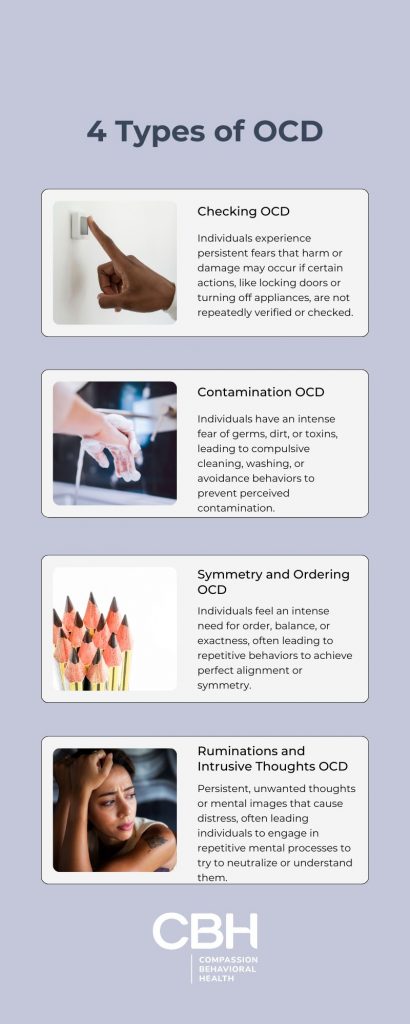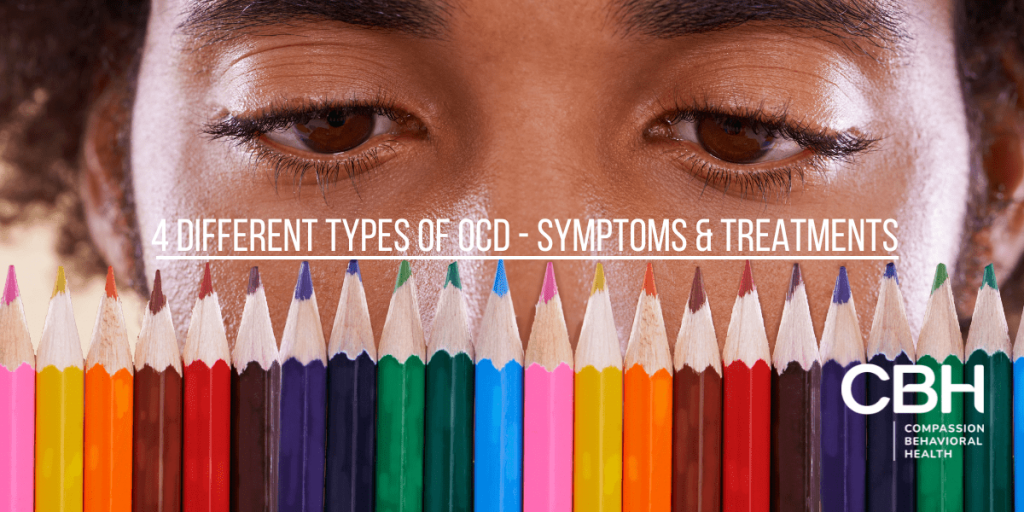Explore the 4 major types of OCD, their impact on mental health, and effective treatments for managing this complex condition. Obsessive-Compulsive Disorder (OCD) is a complex mental health condition that affects millions of people worldwide. The disorder is characterized by recurring, unwanted thoughts (obsessions) and repetitive behaviors (compulsions) that individuals feel compelled to perform. While OCD may manifest differently for each person, it can generally be categorized into four major types: Checking OCD, Contamination OCD, Symmetry and Ordering OCD, and Ruminations and Intrusive Thoughts OCD.
Defining Obsessive-Compulsive Disorder (OCD)
Obsessive-Compulsive Disorder is a chronic mental health condition that causes individuals to experience persistent intrusive thoughts and engage in repetitive behaviors. These obsessions and compulsions are time-consuming, distressing, and interfere with a person’s daily life. OCD affects people of all ages, genders, and backgrounds and can have a substantial impact on their quality of life.
The Psychological Impact of OCD
Living with OCD can lead to significant psychological distress. People with OCD often experience anxiety, fear, guilt, and shame due to the intrusive thoughts and compulsions they face daily. The constant battle with their own minds can be exhausting and overwhelming, leaving individuals feeling trapped and helpless. The fear of judgment and misunderstanding from others can further exacerbate their psychological distress, leading to a sense of isolation and loneliness.

Furthermore, the relentless cycle of obsessions and rituals can cause individuals to become socially isolated. The time and energy spent on performing compulsive behaviors can interfere with their ability to engage in social activities, maintain relationships, and pursue personal goals. This isolation can further deepen their psychological distress, as they may feel disconnected from the world around them and struggle to find a sense of belonging.
Moreover, the impact of OCD extends beyond the individual’s mental well-being. It can also affect their work or academic performance, as the intrusive thoughts and compulsions can consume a significant amount of time and mental energy. This can lead to difficulties in meeting deadlines, maintaining focus, and performing tasks efficiently. The constant need to repeat certain actions or check for potential risks can also be disruptive in professional or educational settings, causing additional stress and impairing overall productivity.

The Biological Factors Behind OCD
Research suggests that there are biological factors at play in the development of OCD. Neurotransmitters like serotonin are believed to play a crucial role in regulating mood and anxiety, and an imbalance in these chemicals may contribute to the development of OCD. Additionally, genetics can make individuals more susceptible to developing the disorder. Studies have shown that individuals with a family history of OCD are at a higher risk of developing the condition themselves.
Understanding these underlying biological factors can help inform treatment approaches. Medications that target serotonin levels, such as selective serotonin reuptake inhibitors (SSRIs), have been found to be effective in reducing the symptoms of OCD. These medications work by increasing the availability of serotonin in the brain, helping to regulate mood and reduce anxiety. Additionally, cognitive-behavioral therapy (CBT) has been shown to be highly effective in treating OCD. CBT helps individuals identify and challenge their irrational thoughts and beliefs, while also teaching them healthier coping mechanisms and alternative behaviors to replace their compulsions.
It is important to recognize that OCD is not simply a personality quirk or a result of weak willpower. It is a complex and multifaceted disorder that requires understanding, support, and appropriate treatment. By addressing both the psychological and biological aspects of OCD, individuals can find relief from their symptoms and regain control over their lives.
The Four Major Types of OCD
OCD, or Obsessive-Compulsive Disorder, is a mental health condition that affects millions of people worldwide. It is characterized by intrusive thoughts, images, or urges (obsessions) that cause anxiety and repetitive behaviors or mental acts (compulsions) aimed at reducing that anxiety. While OCD can present in various forms, there are four major types that are commonly recognized and diagnosed.
1. Checking OCD
Checking OCD is one of the most well-known types of OCD. People with this subtype experience persistent doubts and fears that something terrible will happen if certain actions or items are not repeatedly checked. This can include checking the front door multiple times to ensure it is locked, verifying that appliances are turned off, or even examining their own bodies for signs of illness or injury. The need for reassurance is a common characteristic of checking OCD, and individuals may excessively seek reassurance from others, leading to strained relationships and a constant state of anxiety.

For example, imagine a person with checking OCD who is leaving their house. They may feel compelled to check the front door multiple times, even though they remember locking it. Despite their logical understanding, the fear of a break-in or an accident occurring if they don’t check again overwhelms them. This constant need for checking can significantly disrupt their daily life, making simple tasks time-consuming and exhausting.
2. Contamination OCD
Contamination OCD revolves around an intense fear of dirt, germs, or contaminants. Individuals with this subtype go to great lengths to avoid potential sources of contamination and engage in rituals to maintain a sense of cleanliness and safety. These rituals can include excessive handwashing, avoiding certain places or objects that are perceived as dirty, or constantly cleaning and disinfecting personal belongings. The fear of becoming contaminated can be so overwhelming that it interferes with normal functioning and social interactions.
 For instance, someone with contamination OCD may feel compelled to wash their hands for an extended period, using specific techniques and a certain number of times, even after minimal contact with potential contaminants. They may avoid public places, crowded areas, or even social gatherings out of fear of exposure to germs. This constant need for cleanliness and avoidance can lead to isolation and a diminished quality of life.
For instance, someone with contamination OCD may feel compelled to wash their hands for an extended period, using specific techniques and a certain number of times, even after minimal contact with potential contaminants. They may avoid public places, crowded areas, or even social gatherings out of fear of exposure to germs. This constant need for cleanliness and avoidance can lead to isolation and a diminished quality of life.
3. Symmetry and Ordering OCD
Symmetry and Ordering OCD is characterized by an overwhelming need for things to be aligned, balanced, and ordered in a particular way. People with this subtype may spend excessive amounts of time arranging items, ensuring uniformity, or retracing their steps to maintain symmetry. The inability to achieve perfection or order can cause significant distress and lead to repetitive behaviors.

For example, imagine someone with symmetry and ordering OCD who spends hours arranging their books on a shelf, making sure they are perfectly aligned and sorted by size or color. They may feel compelled to rearrange items repeatedly until they feel a sense of balance and order. The need for symmetry and order can extend beyond physical objects and may also manifest in mental rituals, such as counting or repeating certain words or phrases until they feel “just right.”
4. Ruminations and Intrusive Thoughts OCD
Ruminations and Intrusive Thoughts OCD is characterized by persistent and distressing thoughts or mental images that are difficult to control. These thoughts can be violent, sexual, or even blasphemous in nature and are often contrary to the individual’s personal beliefs or values. Individuals with this subtype often engage in mental rituals, such as silently repeating prayers or counting, to try to alleviate their anxiety.

For instance, imagine someone with ruminations and intrusive thoughts OCD who constantly experiences intrusive thoughts about harming their loved ones, despite having no desire or intention to do so. These thoughts can be terrifying and cause immense guilt and shame. To cope with the anxiety triggered by these thoughts, individuals may develop mental rituals, such as silently repeating positive affirmations or engaging in specific thought-stopping techniques.
It is important to note that while these four types of OCD are distinct, many individuals may experience symptoms from multiple subtypes or exhibit additional OCD-related behaviors. OCD is a complex disorder that can significantly impact a person’s daily life, relationships, and overall well-being. Seeking professional help from a mental health provider experienced in treating OCD is crucial for proper diagnosis and effective treatment.
Recognizing the Symptoms of Different OCD Types
Physical Symptoms of OCD
While OCD primarily affects the mind, it can also manifest in physical symptoms. These can include tension headaches, muscle aches, fatigue, sleep disturbances, gastrointestinal issues, and skin irritations. It is important to recognize that these physical symptoms are linked to the psychological distress caused by OCD and not to any underlying medical condition.
Emotional Symptoms of OCD
OCD often takes a toll on a person’s emotional well-being. Individuals may experience intense feelings of anxiety, fear, guilt, shame, and distress due to their obsessions and compulsions. They may also become frustrated, irritable, or withdrawn, leading to strained relationships and a diminished overall quality of life.
Treatment Options for Different Types of OCD
Cognitive Behavioral Therapy (CBT) for OCD
Cognitive Behavioral Therapy (CBT) is often regarded as the most effective treatment for OCD. It involves working with a therapist to identify and challenge negative thought patterns and behaviors, gradually exposing oneself to anxiety-provoking situations, and developing healthier coping mechanisms. Through CBT, individuals with OCD can learn to manage their symptoms and regain control of their lives.

Medication for OCD
In some cases, medication may be prescribed to help manage OCD symptoms. Selective serotonin reuptake inhibitors (SSRIs) are commonly prescribed as they can help rebalance neurotransmitters in the brain. Medication should always be used in conjunction with therapy, and it is important to consult with a healthcare professional to determine the most suitable option.
Alternative Therapies for OCD
In addition to CBT and medication, there are alternative therapies that some individuals find helpful in managing their OCD symptoms. These may include mindfulness practices, relaxation techniques, support groups, and creative outlets such as art therapy. While these approaches may not be a standalone treatment for OCD, they can complement traditional therapies and provide additional support.
In conclusion, understanding the different types of OCD is crucial in recognizing the diverse ways in which this disorder can manifest. Each type of OCD presents its own challenges and requires tailored treatment approaches. By raising awareness, promoting understanding, and providing effective treatment options, individuals living with OCD can lead fulfilling lives and overcome the burdens imposed by this complex condition.
OCD Treatment at CBH
At Compassion Behavioral Health, we’re committed to providing personalized care that acknowledges how OCD affects each individual. Our team of experts is well-versed in the latest treatment modalities, from advanced CBT techniques to the most effective pharmacological options. We offer a compassionate space for healing, understanding that the journey to managing OCD is not a one-size-fits-all path.
We recognize the courage it takes to seek help and the strength it takes to face OCD each day. That’s why we’re dedicated to not just treating symptoms, but also empowering our clients with the tools and support necessary for long-term management and recovery. Our holistic approach looks beyond the disorder, focusing on enhancing overall well-being and quality of life.
If you or a loved one are navigating the complexities of OCD, reach out to us at Compassion Behavioral Health.




